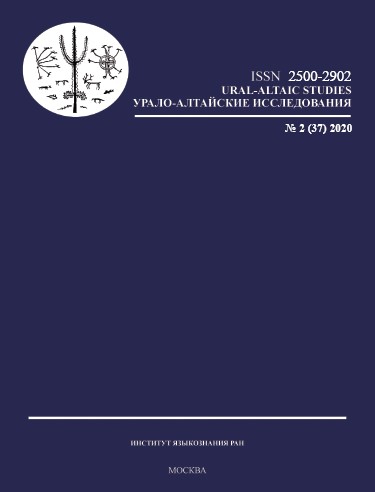О семантике ненецкого Итератива
On the meaning of the Iterative in Nenets
Author(s): Sergei TatevosovSubject(s): Theoretical Linguistics, Semantics, Philology
Published by: Институт языкознания Российской академии наук
Keywords: Iterative; event semantics; telicity; scalar alternatives; pluractionality;
Summary/Abstract: This paper explores the meaning and distribution of the Iterative in Tundra Nenets (rendered by the ngkø morpheme). The main hypothesis advanced in this study is that, contrary to its name, the Iterative is not a morphosyntactic device whose interpretation involves plurality of events / pluractionality. I argue that the Iterative creates an atelic event description that denotes eventualities substantially similar to those from the original extension of a verbal predicate, which nevertheless do not fall under that extension themselves. Relying on [Penka 2006], I implement this informal idea by suggesting that the Iterative invokes alternatives to a modified event predicate ordered on a Horn scale, that is, on a scale where every element entails all the elements ranked lower. Specifically, the Iterative makes reference to close-by lower-level alternatives. Depending on how a relevant Horn scale is construed, on the telicity of a modified event predicate, and on coercive mechanisms involved, this derives the range of interpretations of the Iterative attested in the data. First, if a scale involves ordering induced by the mereological part-of relation, the Iterative derived from telic predicates describes processes immediately preceding but not reaching the culmination. Second, if the ordering derives from degrees of manifestation of a certain gradable property of events (e.g. intensity or continuity), the Iterative makes references to the degrees that fall below the standard of comparison, either absolute or relative. Third, the same derivation can be supplemented by the additional stage of covert pluralization, which outputs a non-quantized description. Fourth, for habitual sentences with the Iterative, two derivations are available, depending on the relative scope of the Iterative and the habitual. If the habitual operator takes a narrow scope with respect to the Iterative, a sentence is characterized by reduced regularity of occurrence of episodic manifestations of the habitual property. If the habitual takes wide scope, the Iterative operates directly on an eventuality description, producing the same range of readings as in a corresponding episodic configuration, which undergo habitualization at the next stage of derivation.
Journal: Урало-алтайские исследования
- Issue Year: 2020
- Issue No: 02 (37)
- Page Range: 58-76
- Page Count: 19
- Language: Russian

